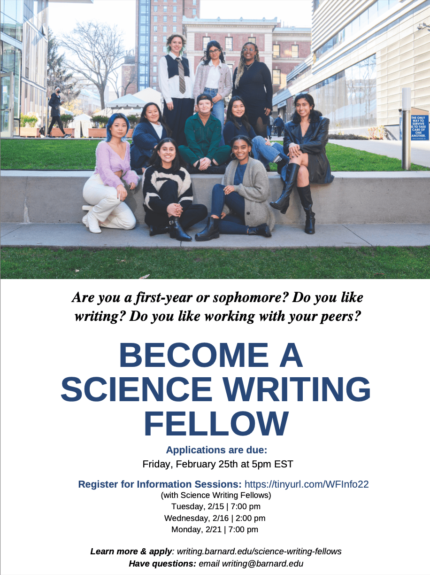Welcome back to Science Fair, Bwog’s weekly roundup of science events happening around campus. As always, email science@bwog.com if you want your event featured.
Perception and the Brain: Views From an Artist and a Scientist
- Tuesday, February 22, 2022. 6:30 to 8 pm.
- Online or in person at the Forum, Columbia University Manhattanville Campus, 601 West 125 Street, New York. Register here.
- “Alan Kanzer Artist-in-Residence Julie Mehretu will discuss her work and reflect on her interactions with neuroscientists at the Zuckerman Institute. She will also join a conversation on how the brain performs its magic.” More information here.
Rohan Deb Roy – Decolonise Mosquitoes
- Thursday, February 24, 2022. 9:30 to 11 am.
- Online event, via Microsoft Teams. Join via link here.
- “In this talk, Rohan Deb Roy addresses this question by focussing on mosquitoes in British India. In the process, Rohan Deb Roy will elucidate three distinct historical processes: ‘invisible labor’, ‘dissent’ and ‘re-colonization’. He argues that the project of ‘decolonizing mosquitoes’ should be grounded on a scholarly praxis that enables historians to formulate newer critiques of colonialism.” More information here.
The Dark Side of the Universe
- Thursday, February 24, 2022. 4 to 5 pm.
- Online event and in person, location in invitation. Register here.
- “Professor Neta A. Bahcall discusses observations of the dark side of the universe and their implications.”…“Bahcall’s work focuses on addressing questions such as: What is the large-scale structure of our Universe? How did structure form and evolve? How much dark matter exists in the Universe and where is it located? What is the nature of the mysterious dark energy? What is the fate of our Universe—will it expand forever or recollapse? “ More information here.
Queer of Science: Zines
- Friday, February 25, 2022. 1:30 to 3 pm.
- Online event Register here.
- “STEM Librarian Erin Anthony, Zine Tech Claudia Acosta, and Zine Assistant Alekhya Maram BC ’25 invert the triangle of evidence based medicine and look at queer takes on other disciplines including sound engineering, psychology, computer and data science, climate science, and even library science.” More information here.
Alternatively, check out the Barnard’s Science Writings Fellows Program
- Applications are due Friday, February 25 at 5 pm.
- Register for an information session here:
- Monday, February 21 at 7 pm.

The Science Writing Fellows are a subset of the Writing Fellows program for Fellows with an interest in working with scientific writing. Writing Fellows are generous readers and responsive listeners. We “fellow” written assignments by asking questions so the writer can explain, expand, and explore their writing. One important aspect of being a Writing Fellow is having a desire to connect with peers and to be curious about their work. Writing Fellows are first and foremost advocates for students’ voices. In addition to these attributes, Science Writing Fellows have an academic background in science and desire to support every student in developing their skills at describing and interpreting data, using scientific language clearly and concisely, and blending the skills learned in their humanities classes with their scientific ones. We welcome Barnard first-years and sophomores in all majors to apply. More information here!
Science Fair; Bird in Vacuum via bwarchives


 0 Comments
0 Comments